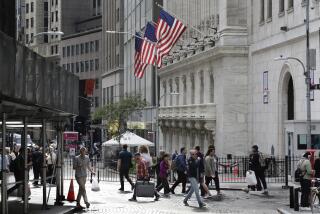Oil Futures Higher; Retail Tab Steady
- Share via
A skittish oil market spurted higher in London and New York while U.S. retail gasoline prices held steady Friday, three days after the terrorist attacks that shut down energy futures trading in New York and sent motorists around the country rushing to top off their tanks.
Traders pushed oil prices higher out of fear that U.S. retaliation for Tuesday’s attacks might disrupt Middle East operations, which produce about one-third of the world’s crude. Sheer hunger for oil trading after the three-day closure of the New York Mercantile Exchange also fed the increase, as did production worries because of a tropical storm that was moving across Florida.
“We’ve got a potential war premium, we’ve got a potential hurricane premium--we’ve got premiums up the wazoo right now,” said Phil Flynn, senior energy analyst for Alaron Trading Corp., a Chicago futures brokerage firm.
But analysts said prices could head down once the market catches its breath. In addition, the slowing global economy and a potential slump in air travel could dampen demand and prices, they said.
“There is no reason that market prices should be moving up. Not one gallon of production has been affected,” said energy economist Philip K. Verleger Jr. The Organization of Petroleum Exporting Countries has assured the market that it will pump more oil if necessary to keep prices stable, he and other analysts pointed out.
“If anything, prices should go down” because of lower demand, Verleger said, estimating that the grounding of the nation’s airlines eliminated 1 million barrels of daily demand for jet fuel.
The November contract for North Sea Brent crude oil, an international benchmark, rose nearly 4%, or $1.06, settling at $29.43 a barrel on the International Petroleum Exchange in London. The price of Brent crude has risen nearly 8% since Tuesday’s assault.
Futures contracts for West Texas intermediate, the U.S. benchmark, had not traded on the New York Mercantile Exchange floor since the attack that destroyed the World Trade Center, only about a block from Nymex, North America’s primary exchange for energy and precious metals futures.
But Nymex managed to get a previously unused Internet trading system operating after a few glitches Friday, and prices initially jumped to match the increases in London.
By the end of the day, West Texas intermediate for October delivery was trading at $29.60 a barrel, up $1.83, or 6.9%, from its pre-attack close. During the roughly two-hour session, it sold for as much as $29.98 a barrel, the highest since May 23.
“It was a typical shutdown-panic sort of move,” said Chris Schachte, an oil trader with GSC Energy in Atlanta, a futures brokerage firm. Economic worries could push prices lower “once everyone has a chance to calm down.”
Flynn called the Nymex Internet session “a tribute to all of those who were not there.”
“Whatever these terrorists’ plot was,” he said, “it did not succeed.”
Several energy trading firms were in the World Trade Center.
Camarillo-based Lundberg Survey, which tracks prices at 8,000 dealers across the country, reported a U.S. average price for self-serve regular gasoline of $1.544 a gallon, up just one penny in the week ended Thursday. AAA, the automobile association, reported a national price of $1.541 a gallon by early Friday, up 2 cents since Tuesday, and a California average of $1.724, up 1.4 cents.
“The terrorist attacks on New York and Washington, D.C., did not result in price gouging,” Lundberg said, adding that prices had been rising before Tuesday. “Not one station surveyed was gouging.”
More to Read
Inside the business of entertainment
The Wide Shot brings you news, analysis and insights on everything from streaming wars to production — and what it all means for the future.
You may occasionally receive promotional content from the Los Angeles Times.










